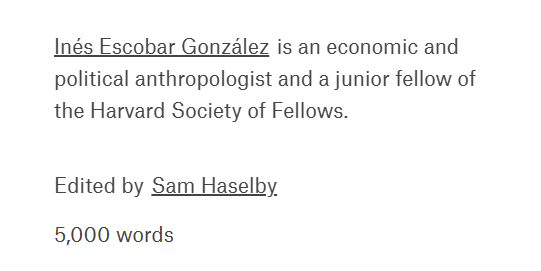The end of neoliberalism?
 The case of Mexico shows that, despite a proliferating discourse that it is over, neoliberalism is as relentless as ever
https://aeon.co/essays/pundits-and-historians-declare-neoliberalism-over-mexico-begs-to-differ
The case of Mexico shows that, despite a proliferating discourse that it is over, neoliberalism is as relentless as ever
https://aeon.co/essays/pundits-and-historians-declare-neoliberalism-over-mexico-begs-to-differ
 The Tlalpan housing project, Mexico City, Mexico, 24 December 2017. Photo by Daniel Becerril/Reuters
The Tlalpan housing project, Mexico City, Mexico, 24 December 2017. Photo by Daniel Becerril/Reuters


The history of neoliberalism was born from the aftermath of the Great Recession. With the political economy in crisis, historians across the Anglosphere set out to trace the genealogies and movement of ideas associated with neoliberalism. Historians of Europe led the way, delving into the archives of the Vienna Chamber of Commerce, the League of Nations in Geneva and the Mont Pelerin Society in the Swiss Alps. Long before North Atlantic reading publics deemed themselves neoliberal, this research made clear, the first decades of the 20th century had seen the forging of neoliberal ideology.
Quinn Slobodian’s
Globalists: The End of Empire and the Birth of Neoliberalism (2018) offered a sweeping intellectual history of this process: as 20th-century empires eroded and democratic movements gained force, European elites were convinced that private property had to be salvaged, somehow, against budding nation-states and their empowered masses. Along the way, influential economists, notably Ludwig von Mises and Friedrich Hayek, became globalists, conceiving the supranational as a space where international institutions could be built and empowered to protect markets, economic freedom and wealth from more democratic nation-states.
Other historians have followed Slobodian’s trails, finding neoliberalism’s origins in the deeper corners of modern European thought. With few if important exceptions, these intellectual histories of Europe have most frankly posed the question ‘How did we, the neoliberals, get here?’, sometimes glossing over a more existential and harder to fathom one: ‘Who are we?’ If societies and their governments became neoliberal at some point in the previous century, what that point was and how it arrived is important to understanding contemporary political economy and the type of collectives and people it has produced.
Following European history, American political history joined the project of historicising neoliberalism while redefining its goals. If scholars of the history of Europe sought the more distant intellectual origins of the present, historians of US politics now seek to periodise neoliberalism as a hegemonic political project. The historian Gary Gerstle’s book
The Rise and Fall of the Neoliberal Order: America and the World in the Free Market Era (2022) makes the case for a beginning and an end to neoliberalism through an analysis of Anglo-American high politics, political discourse and public sentiment. While the intellectual historians of Europe saw a nascent neoliberal project to protect markets and wealth from society in the tumultuous interwar, historians of US politics date the beginning of neoliberal statecraft to a more familiar point of origin in the 1970s and ’80s.
snip



